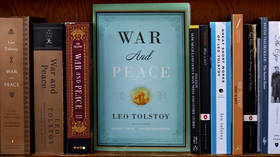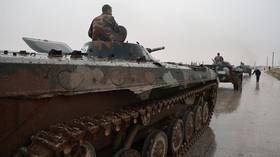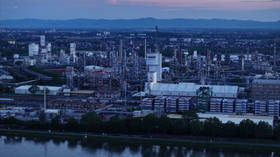Russia goes to EU court over Crimean treasure transfer

Russia is suing Ukraine and the Netherlands at the European Court of Human Rights over the decision of a Dutch court to hand over a collection of ancient gold items discovered on the Crimean peninsula to Kiev, a local official has said.
The saga of the so-called ‘Scythian gold’ started in 2013 when four Crimean museums sent hundreds of artifacts, produced by the nomadic tribe of Scythians from the 6th century BC to the 7th century AD, for an exhibition at the Allard Pierson Museum in the Dutch capital, Amsterdam.
Following the Western-backed coup in Ukraine and Crimea’s reunification with Russia as a result of a referendum in 2014, both Moscow and Kiev laid claim to the treasure, which includes ceremonial helmets, gemstones, weapons, and many other historic items.
In 2016, a court in the Netherlands – which refuses to recognize Crimea as Russian territory – decided that the ‘Scythian gold’ should be transferred to Ukraine. Last June, the Dutch Supreme Court rejected Russia’s appeal against that ruling.
Ukraine’s customs service announced the arrival of 2,694kg of ‘Scythian gold’ in Kiev last November. The National Museum of the History of Ukraine said it would host the collection until the ‘occupation’ of Crimea ends.
The Crimean authorities consider the decision of the Supreme Court of the Netherlands to be “unfair,” Georgy Muradov, the permanent representative of the Republic of Crimea under the Russian president, told Russia’s TASS news agency on Wednesday.
By passing the collection on to Ukraine, the Dutch judges committed “a violation of the rights of [of the Crimean] museums. They were grossly violated contrary to all laws,” he said.
”Because of this, a complaint has been filed with the European Court of Human Rights (ECHR). It concerns two countries: the Netherlands and Ukraine,” Muradov stressed.
The official insisted that the push by Kiev for the ‘Scythian gold’ to be transferred to Ukraine has been “politically motivated.” The Ukrainian authorities “had no right to demand the handover of the Crimean artifacts because they are the property of the museums,” he explained.
Muradov also said the Crimean museums “were deprived of means to protect their property rights” during the hearings in the Netherlands, as their lawyers weren’t present in court when the fate of the collection had been decided.
Earlier this week, the international culture envoy to the Russian president, Mikhail Shvydkoy, said he didn’t have high hopes of the ECHR ruling in Russia’s favor and the treasures returning to Crimea because of how politicized the whole affair has been.












